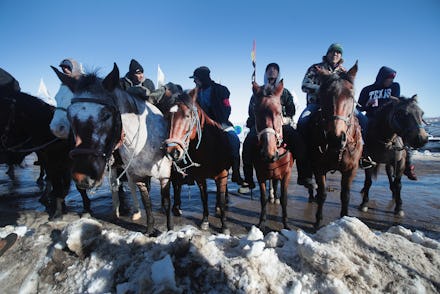Trump is already screwing over rural and working-class Americans — and Standing Rock is proof

It's been 12 days since President Donald Trump took office, and he is already screwing over rural and working-class Americans — just not the ones most people think about.
In a statement Tuesday, Sen. John Hoeven (R-N.D.) announced that the acting Secretary of the Army, Robert Speer, had "directed the Army Corps of Engineers to proceed with the easement needed to complete the Dakota Access pipeline" — an oil project the Standing Rock Sioux tribe has been protesting for months.
The news doesn't mean the easement has been granted yet. But the Sioux and their allies have promised to fight if it moves forward.
Native Americans are rarely considered part of the "rural working-class," a term that's increasingly become a dog whistle for white Middle Americans. But Standing Rock Chairman Dave Archambault II was quick to disavow that notion.
"This [protest against the pipeline] is not only a Native American movement," Archambault wrote in a letter to Trump on Jan. 25, "it is a movement of the working class and rural whose voices are often quieted at the expense of more powerful neighbors."
Home, for the Standing Rock Sioux, is a remote reservation on the plains straddling North and South Dakota. Only 13.3% of residents have a bachelor's degree. If that doesn't count as rural and working class, it's hard to know what would.
The tribe has spent much of the past year leading a massive demonstration against the Dakota Access pipeline, which was slated to pass under Lake Oahe, a vital local water source. In December, the U.S. Army Corps of Engineers denied an easement that would have let construction continue under the lake. But Trump has been clear about his intentions to reverse that decision, signing an executive memo on Jan. 24 to expedite the pipeline's completion.
Trump also promised during his inaugural address on Jan. 20 that "the forgotten men and women of our country will be forgotten no longer." He was talking to a visibly white crowd at the US capitol, so the subtext was clear.
Trump won the White House on a wave of white disaffection. His rhetoric blaming supposed freeloading immigrants for stealing American jobs resonated deeply with white and rural Americans. And they voted for him in droves: 58% of white voters, 62% of rural or small city voters and 67% of white working class voters cast ballots for Trump in the general election. When the president was talking about "forgotten people" in his speech, this is who he meant.
But "forgotten" is arguably a more apt description for Native Americans. Not only do indigenous people suffer from staggering health, educational and income disparities compared to the general population, they often do so far from mainstream attention.
"The common box Native Americans ... are constantly put in is the idea that we are artifacts or nonexistent," MorningStar Angeline, an indigenous actress, told Mic in August 2015.
In this sense, the Dakota Access pipeline battle is indeed a fight for indigenous dignity, land and sovereignty. But it's also a clash of the poor, the working class, the rural and the forgotten, against the corporate interests of big oil.
Trump has demonstrated time and again whose side he's on. The Standing Rock Sioux have argued for months that the project could contaminate their water — there have been more than 2,000 oil pipeline accidents in the U.S. since 1995 — yet Trump has continued to insist that the Dakota Access pipeline must be completed.
It's a cruel move, and an inauspicious beginning for a president who claimed — but likely never actually intended — to be a champion for rural and working-class Americans. And while Trump continues to whip his white base into a frenzy, America's forgotten indigenous people are forgotten even more.